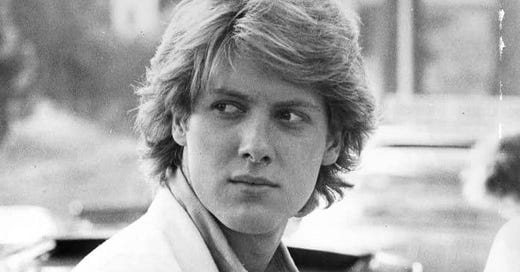Into the Spader-Verse
A quick dive into James Spader's career and what a young adult like me can learn from it.
2023 was a year of my many firsts and at this point in time, I have reached two milestones: starting my first corporate job earlier this year and seeing 50% of James Spader’s filmography. While my first job experience is a story for another day, my typical way to cope with the struggles of work is by watching James Spader movies. A few months ago, I was introduced to Pretty in Pink—the 1986 John Hughes classic teen romantic comedy-drama—during another family movie night. To be honest, I was not fully paying attention to it at first because I was busy doing something else (like watch a different movie on my phone). But there is really something magical about John Hughes movies that I ended up stopping whatever it is that I was doing to pay attention to the second half of the movie, and eventually rewatching the whole thing the day after. I remember liking James Spader because of his remarkable portrayal of the arrogant son-of-a-b*tch, Steff McKee, and I knew I needed to see more of his work.
I ended up spending four months seeing his movies, posting GIFs of my favorite scenes on my Tumblr film blog (yes, I still use Tumblr!), watching a ton of interviews, and reading articles/stories that I could find. Even though majority of media about him often highlights his eccentricity—aren’t we all tired of talking about it by now? —and finding stories about his life almost always becomes unsuccessful, I find it interesting to know about his sentiments on his career and how he came to be as an actor. My personal favorite is a Tumblr post I came across about his 2016 interview with Build Series. James Spader was asked about his contributions that led him to not only be the star, but also be credited as a producer of the NBC show, The Blacklist (which I am yet to start watching, by the way).
“I don’t really work on anything that I work on unless I need to earn a living, because I have a very vital life outside of my work, which I’m perfectly happy to indulge in that life all the time if I were able but I have yet to come into great wealth. So, I have always had to earn a living since I can remember.”
For fresh graduates like me, many have probably dealt with the pressure of starting their careers and wanting to excel. And, in light of the recent pandemic, it is quite evident that more and more members of the workforce are becoming aware of what work-life balance really means to them. Traditionally, one would view their work as a very big part of their lives and make their way of life be dependent on their work—fortunately, this is no longer the case to most people.
As I recall the time when I started my first job, I remember putting an intense amount of pressure on myself that I need to succeed in my professional career. But, learning about James Spader’s mindset helped me realize why I do what I do, and I like to think that we share the same sentiment—maybe my life purpose is outside my 9-5. I would very much prefer spending time with people who are dear to me, go travel somewhere, and experience new things. However, since I do not have the luxury of living an easygoing life, I need to work. This state of mind helps me separate my work from my life—even though it is important to view one’s work seriously by means of excelling and growing a career, I think it’s also important to remember that your work (and career choices) will most likely be based on what will let you live the kind of life you want to live.
While on the topic of working, James Spader also mentions:
“And so, I guess this is a sort of diplomatic way of saying that everything I work on I’m ultimately doing for the money. Because that’s how I pay my bills. I probably just got in a habit of working as hard as I possibly can, and investing as much as I possibly can on whatever I am working on… so that it mitigates some of the shame of the fact that I’m actually doing it for the money.”
By establishing your reason for doing what you do, the next step is to build habits that would let you carry out your work at ease—the habits that you establish is very crucial to your success. I too would like to get into a habit of working and contributing as much as I can rather than constantly viewing work as a never-ending burden (again, it’s because I need to). Even though this may seem easier said than done, I just really want to value the opportunities in front of me and make the most out of it. I am very faithful that by offering result, discipline, and productivity, one will not only get the compensation that they need but get the fulfilling career that they want as well.
“You define what you care about in life. Sometimes with people, their work is the most important thing to them, and sometimes the work enables you to do other things that are more important to you.” — James Spader, Closer Magazine




